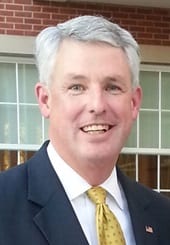Taxpayers clean up Big Pharma’s mess
States must take action to force manufacturers to pay for disposal of unused drugs
LAST YEAR, the United States saw a 13 percent increase in drug overdose deaths, from an estimated 60,147 lives lost in 2016, to an estimated 67,944 in 2017. For perspective, that is enough to completely fill Gillette Stadium, with an overflow of 2,066 individuals.Here in Massachusetts, we experienced a slight decrease in opioid related deaths, from an estimated 2,155 to an estimated 1,977. Although progress is promising, it is clear we need to be doing more.
This Saturday, April 28, cities and towns across Massachusetts will again participate in National Takeback Day, an event organized by the Drug Enforcement Agency and funded by taxpayers. Last October, 912,305 pounds of prescription medicine were collected nationally. That’s 456 tons of unused drugs that were prescribed to private citizens, paid for at the pharmacy, and left unused in medicine cabinets. Pharmaceutical manufacturers reaped big profits, and left it to taxpayers to fund the cleanup.

Unfortunately, it has now become safe to assume everyone reading this article knows someone who has been a victim of the opioid epidemic. Although no two stories are the same, many share one key theme: easy access to prescription medications. Four out of five heroin users began by misusing prescription pain killers, either their own prescriptions or drugs prescribed to someone else that went unused. We know this was driven by pharmaceutical companies aggressively pushing their products for profit.
In 2016, Massachusetts became the first state in the nation to pass legislation that required a statewide Drug Stewardship Program. This program was created to assign the responsibility and costs of collecting, securing, transporting and safely disposing of unwanted prescription medications to pharmaceutical manufacturers, shifting the burden from local budgets and placing it where it belongs. It was agreed upon that to do business in Massachusetts, pharmaceutical companies would have to clean up after themselves, take unused pills off the street, and take this burden off of the backs of taxpayers.
This program was set to begin in 2017. It is now 2018, and it still has not happened. Pharmaceutical manufactures, as well as the Commonwealth, have yet to produce an adequate plan of action, and there is little incentive to do so because the law was amended to include a sunset clause, meaning this “requirement” will end in 2021. If the Governor and Legislature do not commit to eliminating this clause, there is a good chance that the Drug Stewardship Program will end before it can even take effect.
This Saturday, federal, state and local agencies will once again use taxpayer money to fund National Takeback Day efforts.
I am proud of the work my colleagues in the House and Senate, the Governor, the Attorney General and so many others have done in battling the opioid epidemic. However, the work will have been for nothing if the Commonwealth does not commit adequate time and resources to issuing regulations and repealing the sunset clause. We all need to be doing more, and it is time for drug manufacturers to quit hiding behind their disingenuous messaging of putting patient’s health first, and honestly commit to taking back unused medications.
State Sen. John F. Keenan is the chairman of the Special Senate Committee on Addiction Prevention, Treatment and Recovery Options. He represents his hometown of Quincy as well as Holbrook, Abington, Rockland, and parts of Braintree.

No comments:
Post a Comment